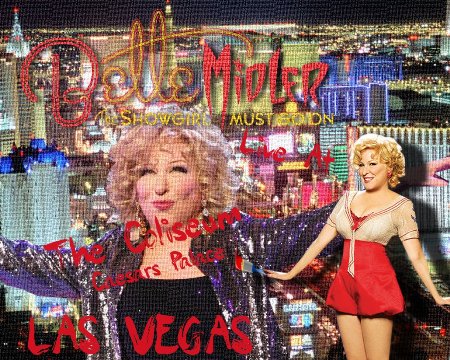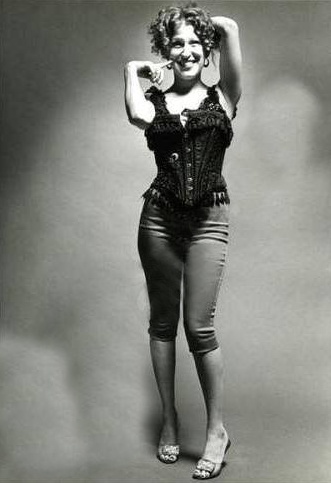WalletPop.com
Eco-Diva: 15 years later, why Bette Midler is still trying to save New York
Andrea Chalupa
May 13th 2009 at 8:50AM

ArtWork: Jonathan Booth
No one inspires picking up your trash or rockin’ a sexy neckline quite like Bette Midler. From the earliest stages of her career in the ’60s and ’70s, the Divine Ms. M was worshiped on Broadway (and in the gay bathhouses) for letting it all hang out. There’s a strength and purpose to her showgirl style, and for the past 15 years she’s taken that spirit offstage with a mission: making New York one of the greenest — and safest — cities in the world. In this economic winter, she’s determined to keep New York City from slipping back into the bad old days of the 1970s, with a little help from her new BFF, rapper 50 Cent. (Gonna gar-den like it’s your birf-day.)
“The bleakness of the ’70s is indelible in my mind,” Midler told WalletPop in an exclusive interview this week. “New York was even bleaker. It was beyond funk.” The Bronx was literally burning, she recalls, as desperate landlords torched buildings to collect the insurance payouts. And you did not set foot in Central Park — even at noon. “There was tremendous flight,” she says. “It was scary. You felt threatened at every step. It was rough.”
While Mayor Rudy Giuliani is often credited with having cleaned up the crime, Midler took care of the grime. She created her New York Restoration Project, raising over $38 million over the years, removing 875 tons of garbage and debris, and saved 114 community gardens from commercial development. “In 1999, we bought community gardens from Mayor Giuliani,” she says, “and took the other ones no one wanted. We have transformed those gardens into living, growing spaces. A lot of them are urban farms.”
The NYRP targets neighborhoods where local markets lack fresh produce and where asthma and diabetes rates are off the charts. Each garden takes $250,000 to build and gets an endowment of $150,000 to maintain. A bag-snagging program provides workers to do the costly work each winter of pulling plastic bags out of trees. A beautiful city is a safe and economically strong city, she says. “That’s what brings in tourists. We don’t want to slide back to being dangerous. We want to insure that what we put forward into the public is welcoming.”
The Obama administration recognizes Midler’s efforts. “Government moves at a glacial pace,” she says, “but this administration seems to be moving in the right direction, and quickly.” Her partnership with Mayor Bloomberg’s MillionTreesNYC, determined to plant a million trees in the city by 2017, has been rewarded $2 million in stimulus funding to create green jobs. Young adults from low-income communities will receive horticulture training to tend to New York’s fragile ecosystem, and hundreds of kids will learn green stewardship, she says.
“I was in Japan over three weeks last year. I did not see a single piece of litter in the entire country — not one paper bag on the ground,” Midler says. “I was beside myself. I was hyperventilating every day. They simply don’t allow littering. When fast food took off in a big way in America, that’s when the streets took off with this stuff.” (She may be right: a British environmental group this year found that McDonalds generates 29% of the country’s litter.) Such is Midler’s notoriety as a green activist that she’s been lampooned, as a guest star, on The Simpsons, depicted chasing highway litterbugs who eye her nervously in a rear-view mirror. In New York, she says, “There are problem areas, and I drive around in my little Prius, calling the sanitation department, shrieking. They will send their SWAT teams up.” She encourages everyone to do the same when they spot a nature-choking mess.
NYRP’s two annual fundraisers — the Spring Picnic on May 19, with rapper 50 Cent, Dolly Parton, Tim Gunn, and Andre Leon Tally; and, on Halloween, the insanely wild Hulaween Ball — serve “recession chic” menus: turkey, pot-pie, and barbecue. (She’s dished these meals out even during the bubble years, to make sure more of her fundraiser dollars go to the cause than to the catering.) Midler, who grew up in Hawaii, says her parents never forgot the Great Depression. “My parents saved almost half of what my father earned,” she says. “My mother made all of my clothes, made all of our meals, never made processed food. You wore everything until it was worn out. Everything was patched.” She learned to sew, too: “I could have been Michael Kors instead of Bette Midler!”
On her Depression Tour in 1975-1976, Midler traveled the country for four months, singing songs for the New Depression (you thought that was a modern concept?), Midler wore the same outfit — a Betsy Johnson jumpsuit — until it literally fell off, she says. Much of her clothes on that tour were her own, and some of the sets were recycled from the Clams on the Half Shell Revue, when show-business tradition dictates that sets are burned after a tour. (Any set still available from her tours is available for purchase, including the one from her notorious King Kong act. Proceeds will benefit NYRP.)
Today she carries on the recession-chic tradition by exchanging handmade gifts with her family during the holidays: books, photo albums, paintings, racy poems. Another of Midler’s favorite ways to save money, of course, is gardening. As more people grow fruit and vegetables for financial and ecological benefits, Midler advises patience, embracing the gruntwork, reading books and watching DVDs on gardening, and swapping out bad soil for the good stuff.
Growing up in Hawaii shaped her deep devotion to nature. “There were Japanese people in the projects where we lived,” she says. “They always had the most beautiful gardens, with the bonsai trees, and I never really forgot that. Hawaii in those days was pristine. The motto was: the life of the land is perpetuated through righteousness. Part of that was treating the land with respect.”
When she first got to New York in her 20s, Midler says, she was shocked by how wasteful society was, how people threw everything out. “Lots of people are sleepwalking,” she says. “Keep your eyes open. We’ve reached the tipping point. If we don’t do something soon, it’ll be irreversible.”






